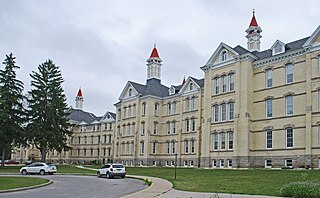
Psychiatric hospitals, also known as mental health units or behavioral health units, are hospitals or wards specializing in the treatment of severe mental disorders, such as schizophrenia, bipolar disorder, and major depressive disorder. Psychiatric hospitals vary widely in their size and grading. Some hospitals may specialize only in short-term or outpatient therapy for low-risk patients. Others may specialize in the temporary or permanent containment of patients who need routine assistance, treatment, or a specialized and controlled environment due to a psychiatric disorder. Patients often choose voluntary commitment, but those whom psychiatrists believe to pose significant danger to themselves or others may be subject to involuntary commitment and involuntary treatment. Psychiatric hospitals may also be called psychiatric wards/units when they are a subunit of a regular hospital.

The Mental Health Act 1983 (c.20) is an Act of the Parliament of the United Kingdom. It covers the reception, care and treatment of mentally disordered people, the management of their property and other related matters, forming part of the mental health law for the people in England and Wales. In particular, it provides the legislation by which people diagnosed with a mental disorder can be detained in a hospital or police custody and have their disorder assessed or treated against their wishes, informally known as "sectioning". Its use is reviewed and regulated by the Care Quality Commission. The Act was significantly amended by the Mental Health Act 2007. A white paper proposing changes to the act was published in 2021 following an independent review of the act by Simon Wessely.
In England, the First-tier Tribunal , more commonly known as the Mental Health Tribunal, is an independent quasi-judicial body established to safeguard the rights of persons subject to the Mental Health Act 1983. It provides for consideration of appeals against the medical detention or forced treatment of a person who was deemed to be suffering from a mental disorder that was associated with a risk to the health or safety of that person or others.

A mental health trust provides health and social care services for people with mental health disorders in England.
The Health and Social Care Select Committee is a Departmental Select Committee of the British House of Commons, the lower house of the United Kingdom Parliament. Its remit is to examine the policy, administration and expenditure of the Department of Health and Social Care (DHSC) and its associated agencies and public bodies. The Clerks of the Committee are Previn Desai and Joanna Dodd.

The Care Inspectorate is a scrutiny body which supports improvement. They look at the quality of care in Scotland to ensure it meets high standards. Where improvement is needed, they support services to make positive changes. The Care Inspectorate was set up in April 2011 by the Scottish Government as a single regulatory body for social work and social care services, including child protection and the integration of children's services. The new organisation took on work in these areas previously carried out by:

The Mental Capacity Act 2005 is an Act of the Parliament of the United Kingdom applying to England and Wales. Its primary purpose is to provide a legal framework for acting and making decisions on behalf of adults who lack the capacity to make particular decisions for themselves.
The Forensic Network is one of Scotland's Managed Clinical Networks. The Network was established in Scotland in September 2003 by the Scottish Government, in conjunction with "The Mental Health (Scotland) Act 2003", and following a review of the State Hospital's Board for Scotland, 'The Right Place - The Right Time'.
The Care Quality Commission (CQC) is an executive non-departmental public body of the Department of Health and Social Care of the United Kingdom. It was established in 2009 to regulate and inspect health and social care services in England.

The Mental Health Act 2007 is an Act of the Parliament of the United Kingdom. It amended the Mental Health Act 1983 and the Mental Capacity Act 2005. It applies to people residing in England and Wales. Most of the Act was implemented on 3 November 2008.

The Mental Health (Scotland) Act 2003, which came into effect on 5 October 2005, is an Act of the Scottish Parliament that enables medical professionals to legally detain and treat people on the grounds of mental disorders, with the Mental Health Tribunal for Scotland and the Mental Welfare Commission for Scotland providing safeguards against mistreatment.
Removal to a place of safety is a form of detention.

Basaglia Law or Law 180 is the Italian Mental Health Act of 1978 which signified a large reform of the psychiatric system in Italy, contained directives for the closing down of all psychiatric hospitals and led to their gradual replacement with a whole range of community-based services, including settings for acute in-patient care. The Basaglia Law is the basis of Italian mental health legislation. The principal proponent of Law 180 and its architect was Italian psychiatrist Franco Basaglia. Therefore, Law 180 is known as the “Basaglia Law” from the name of its promoter. The Parliament of Italy approved the Law 180 on 13 May 1978, and thereby initiated the gradual dismantling of psychiatric hospitals. Implementation of the psychiatric reform law was accomplished in 1998 which marked the very end of the state psychiatric hospital system in Italy. The Law has had worldwide impact as other counties took up widely the Italian model. It was Democratic Psychiatry which was essential in the birth of the reform law of 1978.
In R v Bournewood Community and Mental Health NHS Trust the House of Lords ruled that a man who had been admitted to a psychiatric hospital without capable consent had not been unlawfully detained under the common law. A later European Court of Human Rights ruling, however, found that the man had been unlawfully deprived of his liberty in the meaning of Article 5 of the European Convention on Human Rights.

The Health and Social Care Act 2012 is an act of the Parliament of the United Kingdom. It provides for the most extensive reorganisation of the structure of the National Health Service in England to date. It removed responsibility for the health of citizens from the Secretary of State for Health, which the post had carried since the inception of the NHS in 1948. It abolished primary care trusts (PCTs) and strategic health authorities (SHAs) and transferred between £60 billion and £80 billion of "commissioning", or healthcare funds, from the abolished PCTs to several hundred clinical commissioning groups, partly run by the general practitioners (GPs) in England but also a major point of access for private service providers. A new executive agency of the Department of Health, Public Health England, was established under the act on 1 April 2013.

Blackberry Hill Hospital is an NHS psychiatric hospital in Fishponds, Bristol, England, specialising in forensic mental health services, operated by the Avon and Wiltshire Mental Health Partnership NHS Trust. The hospital also offers drug and alcohol rehabilitation inpatient services, and is the base for a number of community mental health teams.
This disability rights timeline lists events outside the United States relating to the civil rights of people with disabilities, including court decisions, the passage of legislation, activists' actions, significant abuses of people with disabilities, and the founding of various organizations. Although the disability rights movement itself began in the 1960s, advocacy for the rights of people with disabilities started much earlier and continues to the present.

Stoke Park Hospital, was a large mental handicap hospital, closed circa 1997, situated on the north-east edge of Bristol, England, just within South Gloucestershire. Most patients were long-term residents, both adults and children of all ages. A school was on-site. Prior to 1950, it was known as the Stoke Park Colony, which was founded in 1909.
The Winterbourne View hospital inquiry occurred at Winterbourne View, a private hospital at Hambrook, South Gloucestershire, England, owned and operated by Castlebeck. A Panorama investigation, broadcast on television in 2011, exposed the physical and psychological abuse suffered by people with learning disabilities and challenging behaviour at the hospital
A mental health tribunal is a specialist tribunal (hearing) empowered by law to adjudicate disputes about mental health treatment and detention, primarily by conducting independent reviews of patients diagnosed with mental disorders who are detained in psychiatric hospitals, or under outpatient commitment, and who may be subject to involuntary treatment.







